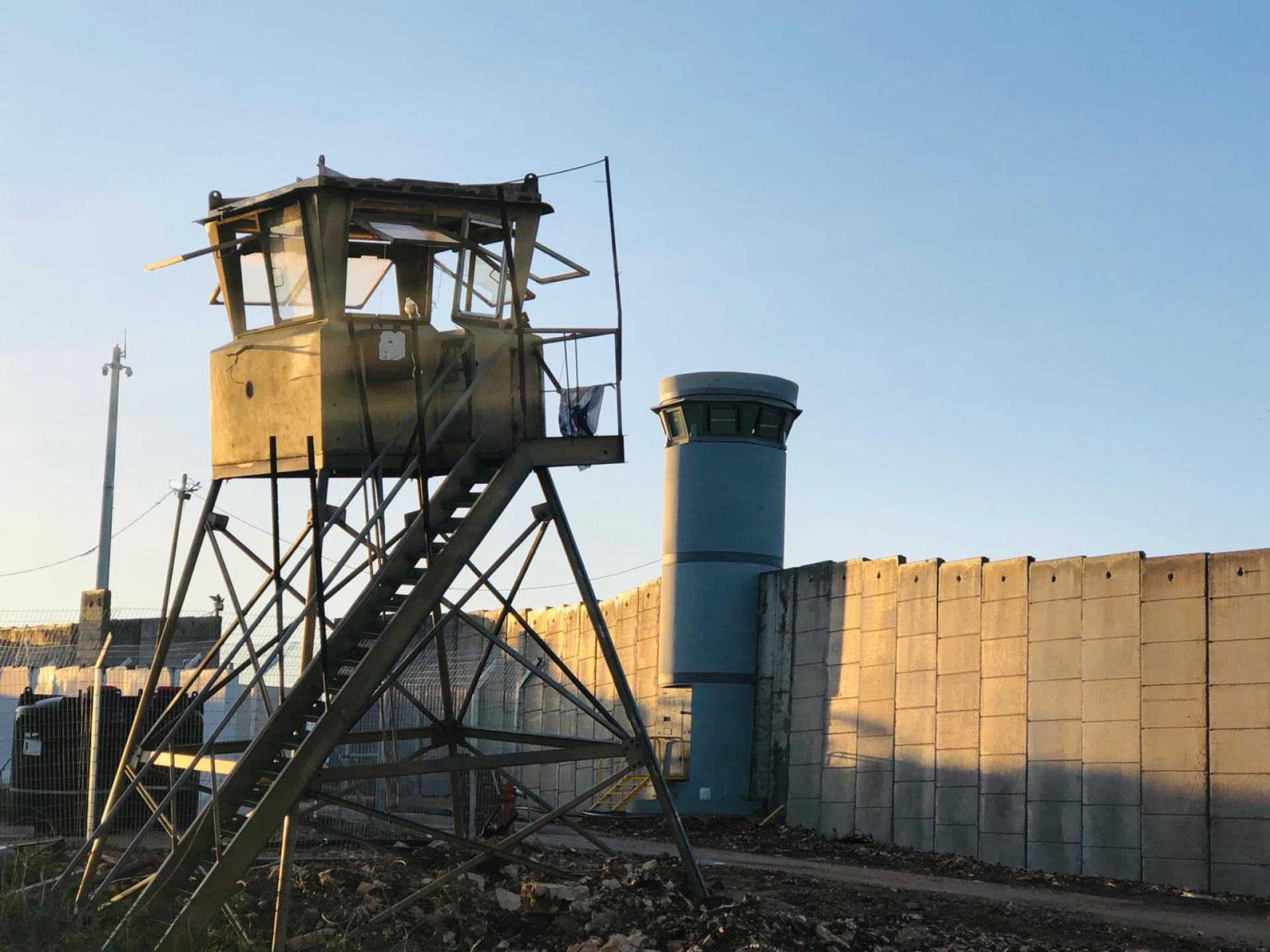The northern checkpoints: the occupation corrupts and also kills and the war corrupts and mostly kills.
We returned to the checkpoints for the first time after the Black Sabbath of 7 October. Since then, the passage of Palestinian workers into Israel have stopped almost entirely. We have had to be satisfied with a few telephone reports from our acquaintances from across the wall.
07:00 – 07:30 – Tura-Shaked Checkpoint
A wall of cement that replaced the separation fence in the northern West Bank, is already not enough. In the section opposite Tura village, they installed a barred fence on top of the wall. The Checkpoint opens from 07:00 – 16:30. During the time we were there, residents of the West Bank who work in the Shahak industrial area and in the settlements of the Seamline Zone, passed through. Four Palestinian cars also crossed. A minibus accompanied by a guard, picks up workers in Shahak. At that hour, we didn’t see residents of the Seamline Zone who work in the West Bank.
Two policewomen from the Border Patrol are surprised to see us there. They hadn’t heard of Machsom Watch and asked us to move back a bit.
The shed for waiting was moved further away from the checkpoint. One of the workers, an elderly man, complains there aren’t any lavatories, mainly for women—not on this side nor on the other side of the Checkpoint. He lives in Tura with his second wife and their baby daughter. His first wife, who died, lived in East Barta’a, and he has children and grandchildren there.
daughter. His first wife, who died, lived in East Barta’a, and he has children and grandchildren there.
On our way to the Checkpoint, opposite the turn to the army base, we noticed yellow cranes parked inside the fenced area. Obviously, they are for the continued placement of fences on top of the wall. Inside the world of walls and fences, a new, good-looking sign greets us, “Welcome to the Shaked Crossing.” The curbs of the sidewalk on the pedestrian path are freshly painted red and white. Opposite the sign, there is an area surrounded by a barred fence that expands the area of the checkpoint, but which the workers use very little anyway. On the ground lay additional parts of the fence. Next to them, a new watchtower is being raised, integrated with the wall, and in front of it, the old watchtower, ashamed.
07:35 – 08:00 -Barta’a-Reihan Checkpoint, the Seamline Zone Side
The upper parking lot, on the Seamline Zone side, is too empty. Bored drivers wait for passengers who don’t come. Individuals go up through the sleeve (the long, enclosed path to the terminal) from the checkpoints to the parking lot. Those who cross work in East Barta’a, in the Industrial area of Shahak, and in the settlements in the Seamline Zone. There are almost no Palestinians who are allowed to work in Israel. Our driver knows a few lucky ones like that. All permits that were issued before the war, were canceled. Those happy workers who are approved—meusharim-- a double meaning in Hebrew-- all have new permits called 00, that also allow lodging in Israel We don’ understand those permits; there are permits that also allow work in the Sealine Zone.
(the long, enclosed path to the terminal) from the checkpoints to the parking lot. Those who cross work in East Barta’a, in the Industrial area of Shahak, and in the settlements in the Seamline Zone. There are almost no Palestinians who are allowed to work in Israel. Our driver knows a few lucky ones like that. All permits that were issued before the war, were canceled. Those happy workers who are approved—meusharim-- a double meaning in Hebrew-- all have new permits called 00, that also allow lodging in Israel We don’ understand those permits; there are permits that also allow work in the Sealine Zone.
Palestinian taxi drivers have to be satisfied with 2-4 transports a day. Their income is very sparse. One of them told us that he has to make do with transport in the Seamline Zone and doesn’t cross to the West Bank, because the Ya’bed-Dotan Checkpoint in the direction of Jenin, is closed. According to him, they already allow passage there; the inspection humiliates them and continues for two hours. They also tell us that the passage at Barta’a Checkpoint is difficult, despite the few workers. The Checkpoint is open at this point, from 06:00 until 17:00. People already arrive at 04:30 to get in line because they pass through in fours with continuous waiting. Whoever is able, prefers to cross at Tura Checkpoint. In the meantime, a
minibus to Shahak arrives, accompanied by a soldier.
They tell us that transferring goods via 25 trucks to East Barta’a is all that is permitted. They also tell us about different ways to obtain work permits that cost a lot of money. After the official notice about the arrest of a forgery network, whose members include the former head of the Liaison and Coordination Ministry, it is possible to believe all kinds of corruption.
The Occupation corrupts and also kills; the war corrupts and mainly kills.
We returned via Harish. At the first square a police station is installed. Construction work in the city has stopped because most of the workers aren’t able to come from the West Bank. On the way to the Tura Checkpoint, we saw from the distance that construction work in the settlement of Tal Menashe was completed. As we continued to Barta’a Checkpoint, we saw that construction in the settlement of Reihan was also completed. Obviously, it is forbidden to harm the settlers.

